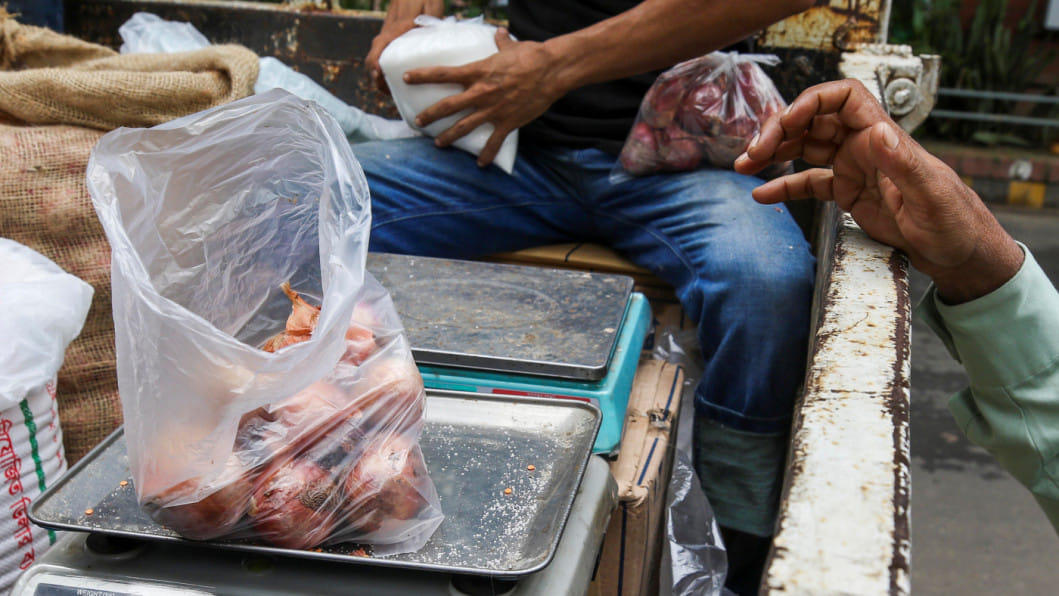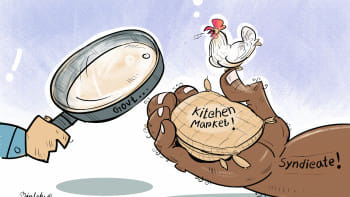Navigating sky-high prices in Ramadan

During Ramadan, while people fast, the market shows its wrath through yet another spell of price hike of essential commodities. This trend operates irrespective of the global economic crisis. Market players take advantage of the higher demand for a few commodities during this month. However, inflationary pressure has continued to prevail for several months now.
Globally, what had started with the supply shortages and logistical constraints during Covid-19 has now become a new normal during the ongoing Russia-Ukraine war.
In August 2022, the inflation rate reached 9.5 percent, the highest in several years. Till January 2023, the inflation rate was on a declining trend but has now increased again. According to the Bangladesh Bureau of Statistics (BBS), inflation increased to 8.78 percent in February 2023 from 8.57 percent in January 2023. The import ban on many items (in view of depleting foreign exchange reserves) has also added to inflationary pressures. During July-January of FY 2022-23, import growth was negative, resulting in some improvement in our current account deficit. Still, import restrictions are hampering businesses due to their raw material needs.
For low income earners, high prices of essential commodities have led to a significant reduction in their purchasing power. There has not been an increase in wages to match the price hikes. So, people are struggling to manage daily necessities for their families. Middle-income households are forced to cut down on many expenses and make significant lifestyle adjustments as they feel the pinch of the increased costs of living.
The most vulnerable groups such as daily wage labourers, low-income people, small business owners, and informal sector workers with limited savings and meagre incomes are forced to resort to various coping mechanisms. They have already exhausted their savings and are compromising on the quantity and quality of food, taking on additional work, and relying on informal credit. Unfortunately, the average inflation rate does not reflect the actual market situation as prices of some commodities have gone up much more than the national inflation rate.
Addressing the ongoing inflationary pressure requires careful and coordinated measures that combine fiscal and monetary policies. However, there has not been much change in policies, resulting in limited success in containing inflation.
In case of monetary policies, the central bank has increased the interest rate of consumer loans to 12 percent, up from nine percent in the Monetary Policy Statement for January-June 2023. However, the ceiling of interest rate on most other loans remains unchanged, though private credit is growing during this time of high inflation.
In Bangladesh, interest rate based monetary management largely remains beyond the purview of policymakers. To contain the current inflation, central banks in several countries have used interest rates as a tool to control credit growth and consumer demand. However, in Bangladesh, there is always resistance from entrepreneurs against interest rate hikes. Moreover, high costs of production due to higher energy prices have strengthened their arguments, as it could hurt their competitiveness. However, competitiveness depends on several other factors, including efficiency of institutions and good governance. These are essential for increasing productivity and efficiency of the private sector which will help them in cost reduction. If these issues are sorted out, the rest of the problems can be resolved. Unfortunately, often economic decisions are influenced by non-economic factors.
In the case of fiscal measures, there is no change in the pattern of public consumption expenditure even though there were decisions on lowering expenditures for projects on the basis of their priorities. The revised Annual Development Programme (ADP) does not hint at containing inflation through reduction in public consumption expenditure. Instead, it follows the same trend, ignoring the current realities. On the other hand, the foreign-financed portion of the ADP has been reduced even though these projects should be given priority during a dollar crisis.
Besides, government borrowing from Bangladesh Bank is increasing in the current fiscal year compared to FY 2021-22. Higher borrowing could increase inflationary pressure since people will have more money in hand to spend. Since domestic resource mobilisation through taxation continues to be low, the government has to rely more on the banking system for additional funds. The current fiscal year has been more difficult for revenue collection due to lower direct tax as business profits are declining and customs tariffs have reduced due to lower imports.
The ongoing high inflationary situation also calls for direct support to poor and low-income families. There should be an effective and enhanced public food distribution system (PFDS) so that a larger number of people can access cereals such as rice and wheat. During Ramadan, the government should increase the supply of essential commodities for distribution through open market sales (OMS). The government should also provide essential items such as edible oil, sugar, lentils, onions, and chickpeas at affordable prices to low-income households.
However, there are challenges for efficient management in distributing these commodities since the beneficiary list is problematic. It must be ensured that only eligible individuals can access these commodities at the lower prices.
To relieve the people of inflationary pressure, the government should provide direct cash support to the poor. The amount of allowances under social safety net programmes for the poor should be increased. There should be enhanced social protection for low-income families and stimulus packages for small businesses so they can survive these trying times.
Arresting high prices requires more focused and extensive actions by the government. It requires an integrated policy framework within which fiscal and monetary policies can function effectively in a coordinated manner. And, as of yet, this has been missing.
Dr Fahmida Khatun is executive director at the Centre for Policy Dialogue. Views are the author's own.

 For all latest news, follow The Daily Star's Google News channel.
For all latest news, follow The Daily Star's Google News channel. 











Comments